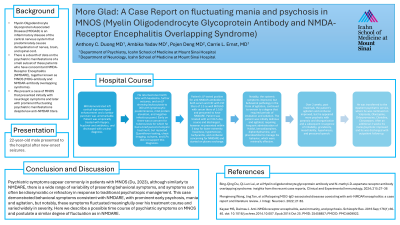Neurocognitive Disorders and Neuropsychiatry
(095) More Glad: A Case Report on fluctuating mania and psychosis in MNOS (Myelin Oligodendrocyte Glycoprotein Antibody and NMDA-Receptor Encephalitis Overlapping Syndrome)

- AD
Anthony Duong, MD (he/him/his)
Clinical Instructor
Elmhurst Hospital Center/Icahn School of Medicine at Mount Sinai
Brooklyn, New York 
Carrie L. Ernst, MD, FACLP
Associate Professor
Icahn School of Medicine at Mount Sinai
New Rochelle, New York- AY
Ambika Yadav, MD
Assistant Professor and Attending Psychiatrist
Mount Sinai Hospital
New York, New York - PD
Pojen Deng, MD
Assistant Professor
Mount Sinai Health System
New York, New York
Presenting Author(s)
Co-Author(s)
Background: Myelin Oligodendrocyte Glycoprotein Associated Disease (MOGAD) is an inflammatory disease of the central nervous system that predominately causes demyelination of nerves, brain, and spinal cord. There is a dearth of data on the psychiatric manifestations of a small subset of these patients who have concomitant NMDA-Receptor Encephalitis (NMDARE), together known as MNOS (MOG-antibody and NMDAR-antibody overlapping syndrome). We present a case of MNOS that presented initially with neurologic symptoms and later with prominent fluctuating psychiatric manifestations despite low anti-NMDAR titers.
Case: 22-year-old male presented to the hospital after new-onset seizures. MRI demonstrated left cortical leptomeningeal enhancement and a lumbar puncture was unremarkable. Patient was empirically treated with Keppra, Acyclovir and antibiotics, and discharged with unclear diagnosis. He returned one month later with headache, further seizures, and an LP showing leukocytosis to 300 with lymphocytic predominance, mild protein elevation, and negative infectious panel. Early on there was a concern for tuberculosis for which he had a brief period of empiric treatment, but repeated Quantiferon testing, chest imaging, cultures, and LPs did not support this diagnosis. Patient’s LP tested positive for anti-NMDAR antibodies in both serum and CSF with CSF titers of 1:5 as well MOGAD with serum titers of 1:160 and presumed to have NMDARE. Patient was treated with an IVIG 5-day course and discharged, however re-presented within 3 days for lower extremity heaviness, hypertension, tachycardia, and confusion concerning for NMDARE and started on plasma exchange. Notably, the systemic symptoms improved, but behavioral pathology in the form of agitation, continued to worsen to a degree that required periods of intubation and sedation. The patient was initially delirious and agitated, requiring frequent administration of Haldol, benzodiazepines, diphenhydramine, and phenobarbital to manage his behavior, which were minimally effective. Over 2 weeks, post rituximab, the patient’s agitation and confusion improved, but he appeared more psychotic with paranoia and disorganization and a subsequent resurgence of irritability, grandiosity, mood lability, hyperkinesis, and pressured speech. He was transferred to the inpatient psychiatric service, where he was continued on Valproate, Olanzapine, Chlorpromazine, Clonidine, Clonazepam, After an additional 2 weeks his manic/psychotic improved and he was discharged with outpatient follow-up.
Discussion: Psychiatric symptoms appear commonly in patients with MNOS (Du, 2023), although similarly to NMDARE, there is a wide range of variability of presenting behavioral symptoms, and symptoms can often be idiosyncratic or refractory in response to traditional psychotropic management. This case demonstrated behavioral symptoms consistent with NMDARE, with prominent early psychosis, mania and agitation, but notably, these symptoms fluctuated meaningfully over his treatment course, and varied widely in severity. Here we describe a possible time course of psychiatric symptoms on MNOS and postulate a similar degree of fluctuation as in NMDARE.
References:
Bing-Qing Du, Qi-Lun Lai, et al Myelin oligodendrocyte glycoprotein antibody and N-methyl-D-aspartate receptor antibody overlapping syndrome: insights from the recent case reports, Clinical and Experimental Immunology, 2024; 215:27–36
Mengmeng Wang, Jing Tan, et al Relapsing MOG-IgG-associated diseases coexisting with anti-NMDAR encephalitis: a case report and literature review. J. Integr. Neurosci. 2022; 21:82.
Presentation Eligibility: Not previously published or presented
Diversity, Equity, and Inclusion: This case highlights the importance of CL Psychiatrists in advocating for those who often are unable to advocate for themselves. The patient was an undocumented immigrant who spoke limited English, had limited health literacy, and was uninsured. Those with generally low social determinants of health often fall through the cracks of healthcare, however, given the gravitas of this patient's newly diagnosed illness and lifelong care he will need, our team sought to address these through a multidisciplinary approach.

